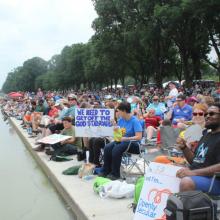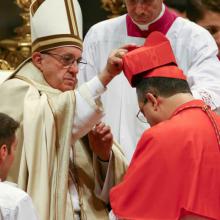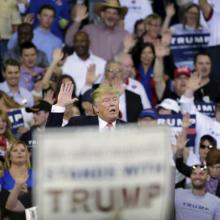Americans
Kevin L. Ladd, a professor of psychology at Indiana University South Bend, said it makes sense that, as society grows less religious in the traditional sense, fewer people are turning to prayer.
More than half of Americans surveyed — 53 percent — believe undocumented persons have no constitutional rights when, in actuality, they do.
In the midst of a raging discussion about what it means to be American, it is worthwhile to reflect on the profound ambivalence of American civil religion — perhaps the most powerful force for creating a shared national identity.
In 1967, Robert N. Bellah’s seminal essay, “Civil Religion in America,” created a template for how both the right and the left defined civil religion to cultivate a sense of belonging, particularly in an era of turbulence. During this period of increasing polarization, Bellah’s words are more relevant than ever.
Researchers also asked about what people think motivates religious believers who oppose sexual freedom. Almost half — 49 percent — said faith is the motivator. A fifth — 20 percent — said the motivator is hate. Another 31 percent were not sure.

Image via Gil C/Shutterstock.com
On April 10, Columbia University presented 21 Pulitzer Prizes for achievements in journalism, literature, and music. Notables from the list of social justice-oriented works that received a Pulitzer Prize include: New York Daily News and ProPublica receiving the Public Service award for reporting on evictions of mostly poor minorities carried out by police abusing the law —
If you don’t need or want insurance, some ask, why should you have to pay for other people’s coverage?
I know people who think this way, and they resent having the government obligate them to pay into the system.
Understanding that many Americans struggle and pay a high cost under the Affordable Care Act, we cannot really blame some for holding this position. But responsible citizenship compels us to take a broader view.
When President Obama signed a newly strengthened international religious freedom act on Dec. 16, the intention was to protect religious believers around the world.
But the freshly signed act is being heralded by some legal scholars as a different milestone — for the first time, atheists and other nonreligious persons are explicitly named as a class protected by the law.
This election season has been an anxious time for Muslim Americans. After the election, my Facebook feed was filled with Muslim mothers wondering how to explain to their children that the new president is a man who had proposed requiring them to register with the government, and called for a ban on people of their faith coming to the United States.
As we try to absorb what this election means, we must contend with how Muslims have been cast. For the president-elect, we are either terrorists or terrorist sympathizers, who are conflated with the threat of “radical Islam.” For the most part, Democrats too see Muslim Americans through a narrow counterterrorism lens.
At a solemn ceremony in St. Peter’s Basilica, to elevate 17 new cardinals, Pope Francis, on Nov. 19, delivered a ringing plea to the world, and his own Catholic Church, to reject “the virus of polarization and animosity," and the growing temptation to “demonize” those who are different.
The pontiff’s address came across as a powerful, gospel-based indictment of the populist and nationalist anger roiling countries around the world, displayed most recently by the stunning election of Donald Trump as president of the U.S.

Image via Evan El-Amin/Shutterstock.com
On Nov. 14, in a press conference at the White House, President Obama spoke about the possibility that President-elect Donald Trump may get rid of his executive action "Deferred Action for Childhood Arrivals" (DACA). DACA enables undocumented immigrants who arrived in the U.S. before their sixteenth birthday, before June 15, 2007, to remain in the country without fear of deportation and receive a two-year work permit that can be renewed.

Image via katatonia82/Shutterstock.com
While Americans watch Hillary Clinton and Donald Trump fighting to the finish, in a noisy and polarized campaign, Germans are quietly debating their own presidential election in far different terms.
Among the names put forward as candidates are two leading Protestant bishops — one of them a woman — and even a respected Muslim writer.
People need to believe in something, or someone, or Someone.
This human need to believe is a very powerful force. It can overcome a great deal of countervailing evidence. One place this is obvious is in politics.
For the first time in three general election debates, a moderator asked the presidential candidates on Oct. 19 about abortion.
Given that abortion has rightly been described as the source of America’s second civil war, there has been a baffling lack of engagement with it this election cycle.
A poll by PRRI, published Oct. 19, shows that 72 percent of white evangelical Protestants now believe that immoral behavior by an elected official doesn’t mean the official is incapable of performing their duties. This is a vast increase from the year 2011, when only 30 percent of white evangelical Protestants shared this view.

Image via Ozgur Coskun/Shutterstock.com
The study comes in the same year that Larycia Hawkins — Wheaton College’s first black, female professor to receive tenure — parted ways with the evangelical flagship school after she posted on Facebook that both Christians and Muslims worship the “same God.” The controversy stirred fresh debate among evangelicals about whether all religions worship the same God, and whether God accepts the worship of all religions.
The typical American underestimates how many Protestants there are in the U.S., and vastly overestimates the number of religious minorities such as Mormons, Muslims, and atheist/agnostics, according to a new study.
Grey Matter Research and Consulting asked 747 U.S. adults to guess what proportion of the American population belongs to each of eight major religious groups: Protestant, Catholic, Jewish, Mormon, Muslim, atheist/agnostic, believe in God or a higher power but have no particular religious preference, and any other religious group.
The average response was that 24 percent of Americans are Catholic, 20 percent are Protestant, 19 percent are unaffiliated, 8 percent are Jewish, 9 percent are atheist or agnostic, 7 percent are Muslim, 7 percent are Mormon and 5 percent identify with all other religious groups.
When I was a sophomore at Bethel University, I was the top 1,500-meter runner on my track team. Then, my junior year, a transfer student came, and she was really fast. She quickly took my place as the fastest miler on the team, winning multiple national championships in the process.
I’ll admit to having felt a little bit frustrated because she came in from the outside and passed me up. But training with her is one of the key reasons I was ultimately able to finish sixth at the national meet, good enough to earn All-American honors.
She pushed me to become better. She gave me someone to chase. She brought more attention to our school and our team, resulting in more fast recruits. In short, she made me and our whole team better.
As the London Olympics begin this week, the United States counts many “transfers” — immigrants from all over the world who are now U.S. citizens — among its top athletes. Some people may feel threatened by these immigrants because they are potentially taking the place of others who were born here.
But I think our immigrants make us better, just like my transfer teammate made me better. They continually push us to do better, work harder and find new ways to improve.











